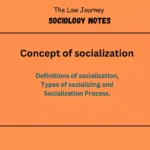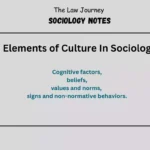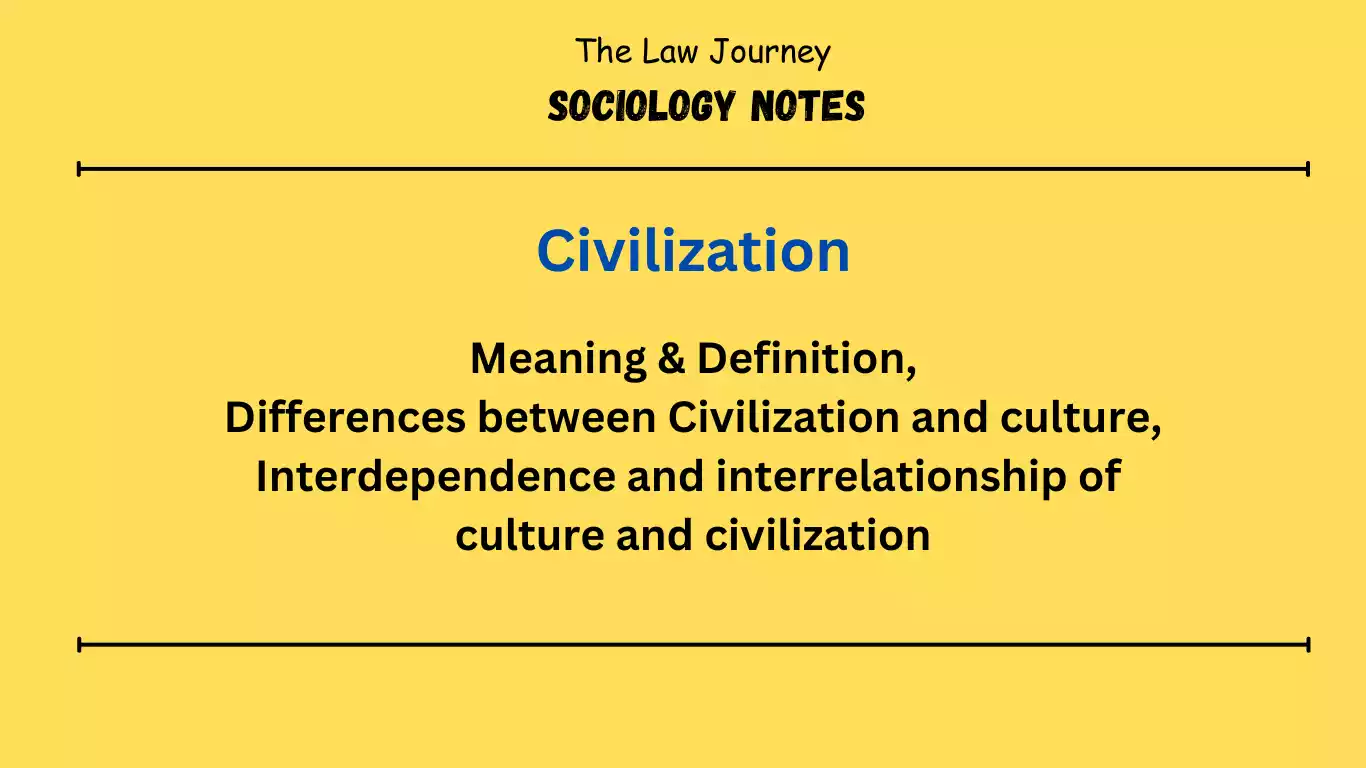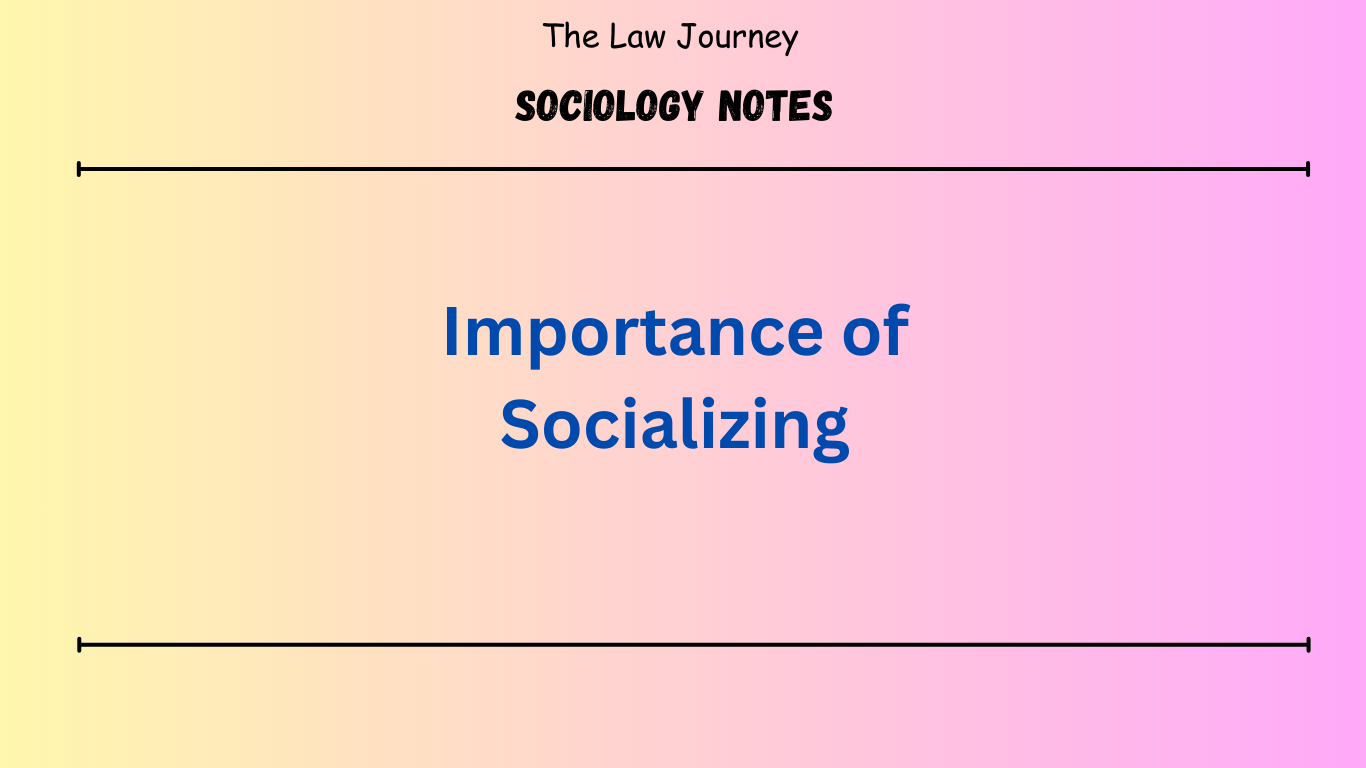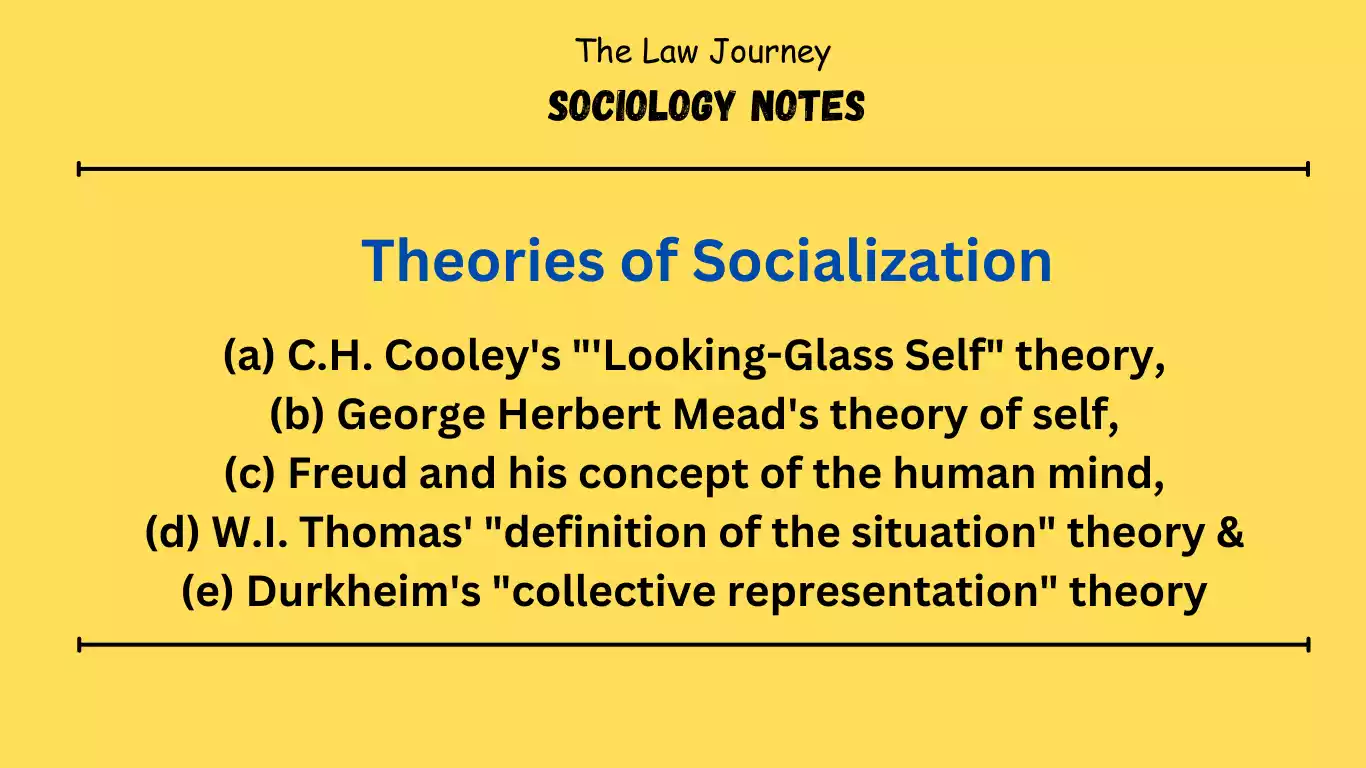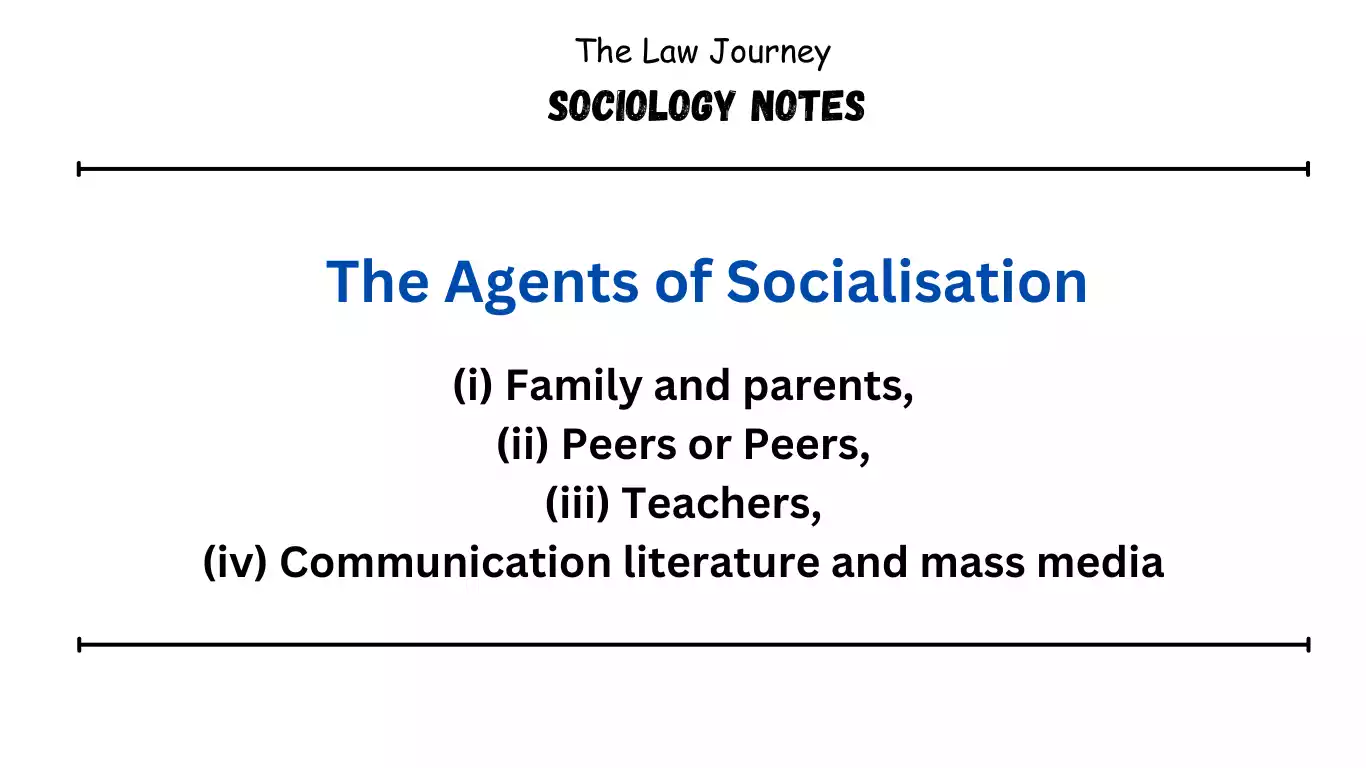The term “civilization” comes from the Latin word “Civitas” meaning city. Therefore, this term refers to all the achievements characteristic of human life in organized cities. Cities emerged relatively late in human history, so “civilization” refers to a particular stage in human evolution. In contrast, culture describes collective life at all stages of human social development, and the term civilization is also used to include all social organizations and other achievements that distinguish humans from other animals.
Definition
- Goldenweiser used the term ‘Civilisation’ identically with culture to refer to all human achievements.
- Kant used the term civilisation to mean outward behaviour of man.
- According to Gillin and Gillin, civilization is a more complex and evolved form of culture.
- Ogburn and Nimkoff conceived of civilisation as the latter phase of the superorganic culture. According to Madlver and Page, civilization is the whole apparatus of life.
Civilization refers to the devices and tools used to control nature. This includes technical and material equipment such as printing presses, locomotives, tractors, radios, televisions, teleprinters, typewriters, airplanes, and machine guns. It also includes the entire machinery of economic and political organization. Our schools, universities, monetary systems, banking systems, parliaments, insurance systems, etc.
That is, as far as means are concerned, civilization is external, mechanical, and utilitarian.
We do not need the products of civilization for their own sake, but to meet our needs. For example, travel requires cars, scooters, buses, and locomotives; radio, television, and mobile communications; communications require post and telegraph; trade and commerce require banks and monetary systems. Don’t own these things just for the sake of owning them difference between culture and civilization The terms “culture” and “civilization” are often differentiated for various reasons. Both represent her two major areas of human behavior and experience.
Differences between Civilization and culture
Civilization has a precise scale, but culture does not.
The products of civilization are those that can be measured quantitatively for efficiency. It’s easy to say that a car is better than a hand plow, or that a currency or banking system is better than a primitive barter system.
But cultural products cannot be measured. We can judge cultural products only through personal judgment. But they cannot be measured or quantified. If someone says that Kalidasa’s literary works are better than Shakespeare’s, we cannot prove or refute it, but rather we can only agree or disagree with their words. you can’t. Cultural values, opinions, ideas, ideologies, morals, customs, beliefs, fashion, etc. are immeasurable. Different ages and different groups have their own standards for judging these cultural things.
Civilization always advances, but culture does not.
According to McYear and Page, civilization continues as long as there is no break in social continuity. It always shows a persistent upward trend and is already conserved. Each generation adds its own achievements to the already accumulated energy and intelligence. Therefore, all technological achievements are improved compared to the past.
Once our tools are discovered, humans continue to improve them. The change from dirt roads to tar roads to cement-concrete roads, from bows and arrows to machine guns to atomic bombs, shows progress. The progress of civilization is certain. Progress in the cultural field is not guaranteed. Culture doesn’t always progress. The pinnacles reached in the field of religion and spirituality by Gautama Buddha, Shankaracharya and Swami Vivekananda were not reached by their followers. Similarly, Kalidasa, Bharavi and Bāsa in Sanskrit literature still maintain their dominance.
However, in the realm of civilization, the discoveries of Newton and Edison became the basis for further discoveries. However, culture cannot be said to be unchanging. There is development in culture, even if it does not necessarily mean progress.
Products of civilization are easier to transmit than products of culture.
The products of civilization are available to everyone. Knowledge about civilizations can be passed on very easily, without much effort. The work of engineers and mechanics is not limited to other engineers and mechanics. We can enjoy the products of civilization without sharing the ability to produce them. Millions of people may be using radios, televisions, telephones, cameras, etc. without understanding their technology or how they work. Cultural products, on the other hand, can only be passed on among like-minded people. Anyone with a talent for poetry can appreciate poetry alone. An artist’s work belongs only to those who have artistic understanding.
Civilization is borrowed without loss or change, but culture is not.
People can easily borrow the products of civilization. Technical equipment and systems can be borrowed or transferred without any problems. It is easy for Indians to adopt scientific methods invented in the West, but it is difficult for foreigners to adopt Indian cultural elements.
Therefore, civilization is much more widespread than culture. Different groups may use similar products but have different cultures. Many Eastern countries have adopted Western technology, but each retains its own unique culture. There may be some “cultural borrowings” (e.g. styles of dress, manner of speaking, fashion, trends, diet, entertainment, etc.), but these are insignificant compared to borrowings from civilization. .
Civilization is external, culture is internal.
Civilization is external, mechanical, and utilitarian. Respond to external needs Human. Civilization is a means. In a sense, it reflects the material wealth of humanity. Culture is internal. It refers to internal values. It is the way we live and think, our actions and actions, our expression in art and literature, philosophy and religion, morality, recreation and entertainment, dance, drama and music. As the philosopher Kant emphasized, civilization is a matter of external behavior, whereas culture requires morality as an internal state of human beings. As McBurr and Page said, “Civilization is what we have; culture is what we have.”
Finally, the products of culture reveal the nature of individuals, social groups, and nations, whereas the products of civilization do not. In the field of culture, artists, poets, and painters can express their love of beauty, admiration for literature, and fascination with art through works of art, literature, and painting. Engineers, on the other hand, cannot express their individuality, love of beauty, likes and dislikes, morals and values through machines, discoveries and inventions.
Interdependence and interrelationship of culture and civilization
Civilization and culture do not reveal two independent and distinct systems. Those differences are only relative, not absolute. They are not only interdependent, but also interactive. Both are artificially created. One for his comfort and luxury, and the other for his satisfaction and happiness. One is just as important as the other. The “order” of civilization influences the “order” of culture.
Objects of civilization called “artifacts” are influenced by culture called “quantitative artefacts.” Culture is also influenced by the goods of civilization. In general, a cultural character is added to the utilitarian order. We want fashion and style, and we display it on cars, buildings, etc. Similarly, our philosophy, literature, and learning are heavily influenced by the printing press.
Some civilizational goods and everyday objects acquire a cultural character over time. The tools and utensils of primitive communities are also symbols of culture. The various items discovered during the excavations, such as pots, vessels, jewelry, coins, weapons, and tools, reveal the culture of the ancient people.
Civilized environments can influence our thinking, values, morals, goals, ideals, ideologies, and more. This machine brought new habits and pleasures, new philosophies and ethics. Advances in science and technology have changed our worldview. Cultural order also influences civilization. Every person and every age has their own way of life. We consider new inventions and technologies in the context of our way of life and values.
New aspirations and values can create a new civilization. Culture is the place where civilization grows. Civilization gives strength and durability to the wheels of society. According to Ogburn, civilization stands for “material culture” and culture means “non-material culture.” If civilization is like a body, culture is its soul.
McVere and Page clearly demonstrated the interrelationship of culture and civilization. A civilization, they say, is a ship that “can call at various ports.” The ports we head to remain cultural decisions. Without ships we could not sail at all. Depending on the condition of the ship, it may sail faster or slower, and its voyage time may be longer or shorter. But the direction we take is not determined by the ship’s design. The more efficient we are, the more ports are within our reach. ” In other words, civilization is the driving force of society. Culture is their handle.
Related Post
- Concept of Social Groups in Sociology
- RTI notes
- Political Notes
- Legal History Notes
- moot court memorial maker
- Law of Torts notes
- law project maker
Reference Books
- C.N. Shankar Rao – Principle of sociology with an introduction to social thoughts
- Introduction to Sociology by Anthony Giddens
- A Dictionary of Sociology by John Scott
- Sociological Theory by George Ritzer
- Handbook of Indian Sociology by Veena Das
- Social Change in Modern India by M N Srinivas













